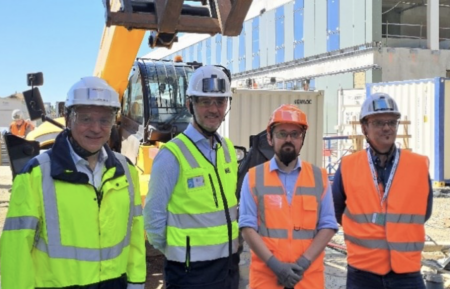The University of Warwick is increasing fuel efficiency and reducing emissions in JCB vehicles of the future.
Intelligent software, developed by the UK university’s research and manufacturing arm, WMG, will be introduced to future JCB construction vehicles that will lead to fewer CO? emissions while still maintaining the necessary level of performance.
Created as part of the Off-Highway Intelligent Power Management (OHIPM) project a collaboration between JCB, WMG and Pektron which is part-funded by Innovate UK, the intention was to contribute to producing more environmentally friendly vehicles.
The OHIPM project concluded in Summer 2017, and intelligent JCB machines utilizing this technology could be on the market by 2019-2020.
Lee Harper, principal engineer at JCB, said, “This collaborative project has helped to identify and develop future technologies that can improve the efficiency of many off-highway machines. The novel technology has shown great promise when tested over a variety of real-world duty cycles.”
The WMG team analyzed huge amounts of JCB data to establish which parts of the machine fleet could be most effectively optimized through intelligent power solutions. The team then created the control software to operate intelligent engines with automotive powertrain technology, enabling them to sense when the machines are idle and make the decision to switch themselves off (or power down) when power is not required leading to optimal energy efficiency and minimal pollution.
Many off-highway machines are left running while idle for much of their life potentially wasting fuel and increasing operating costs. The WMG technology was tested with prototype hardware and installed in a JCB Hydradig, allowing ‘real-life’ simulations to be conducted on actual machines.
Dr James Marco, expert in hybrid and electric vehicles at WMG, commented, “Being able to extend our control and systems modeling expertise into the off-highway sector and to work with both JCB and Pektron engineers has made this a really exciting and rewarding project to be a part of and one where the research has the potential to deliver real impact for all partners.”
WMG’s combination of academic expertise and state-of-the-art facilities with its Energy Innovation Centre and new Control Systems Laboratory meant it could offer experience, quality and speed to this project.
Through working together on the OHIPM, both WMG and JCB have also collaborated on another project the Innovate UK-funded AMPLiFII (automated module-to-pack pilot line for industrial innovation). Led by WMG, AMPLiFII aims to produce high-voltage electric vehicle batteries suited to more than one manufacturer, and at a scale for full commercial production.
November 17, 2017




